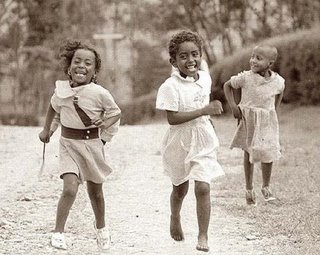
- Almost 40 million people are living with HIV/AIDS.
- 2.9 million people died of AIDS-related illness in 2006.
- 2006 saw 4.3 million new infections, with 2.8 million (65%) in sub-Saharan Africa. (Note: "Sub-Saharan Africa" means all of Africa except Northern Africa, so it includes Ethiopia.)
- 6,000 children are orphaned by AIDS every day. Worldwide, 15 million children have lost parents to AIDS.
- Every 14 seconds, a child loses a parent to AIDS.
They are counting on us.

Of the 15 million orphan-reasons to care about World AIDS Day, an estimated 4 to 6 million live in Ethiopia. Whether or not the child we adopt has lost a parent or two to AIDS, in many ways they are all AIDS orphans--for without this plague on the land would be millions more to raise the nation out of poverty, to grow crops, to give health care and education, to take all these children into Ethiopian homes to be loved and cared for. But there are too many.
I have begun reading There Is No Me Without You by Melissa Fay Greene, a journalist who has added two Ethiopian children to her family. She writes of her reaction when in 2000 she encountered the UN statistics of 12 million AIDS orphans in sub-Saharan Africa:
Who was going to raise twelve million children? That's what I suddenly wanted to know. . . . Who was teaching twelve million children how to swim? Who was signing twelve million permission slips for school field trips? Who packed twelve million school lunches? Who cheered at twelve million soccer games? (That sounded like our weekends.) Who was going to buy twelve million pairs of sneakers that light up when you jump? Backpacks? Toothbrushes? Twelve million pairs of socks? Who will tell twelve million bedtime stories? Who will quiz twelve million children on Thursday nights for their Friday-morning spelling tests? Twelve million trips to the dentist? Twelve million birthday parties?
Who will wake in the night in response to eighteen million nightmares?
Who will offer grief counseling to twelve, fifteen, eighteen, thirty-six million children? Who will help them avoid lives of servitude or prostitution? Who will pass on to them the traditions of culture and religion, of history and government, of craft and profession? Who will help them grow up, choose the right person to marry, find work, and learn to parent their own children?
Well, as it turns out, no one. Or very few. There aren't enough adults to go around. Although in the Western industrialized states HIV/AIDS has become a chronic condition rather than a death sentence, in Africa a generation of parents, teachers, principals, physicians, nurses, professors, spiritual leaders, musicians, poets, bureaucrats, coaches, farmers, bankers, and business owners are being erased.
The ridiculous numbers wash over most of us. This is happening in our time? . . . How can the rest of us—normal citizens, steering along our paved streets between home and school, work and playground, mall and hardware store, holding open the front door with a foot while maneuvering inside with the mail, the grocery sacks, the purse, a paperback, the children's backpacks—how can the rest of us break through?
....
Adoption is not the answer to HIV/AIDS in Africa. Adoption rescues few. Adoption illuminates by example: these few once-loved children—who lost their parents to preventable diseases—have been offered a second chance at family life in foreign countries; like young ambassadors, they instruct us. From them, we gain impressions about what their age-mates must be like, the ones living and dying by the millions, without parents, in the cities and villages of Africa. For every orphan turning up in a northern-hemisphere household—winning the spelling bee, winning the cross-country race, joining the Boy Scouts, learning to rollerblade, playing the trumpet or the violin—ten thousand African children remain behind alone."Adoption is a last resort," I would be told in November 2005 by Haddush Halefom, head of the Children's Commission under Ethiopia's Ministry of Labor, the arbiter of intercountry adoptions, "Historically, close kinship ties in our country meant that there were very few orphans: orphaned children were raised by their extended families. The HIV/AIDS pandemic has destroyed so many of our families that the possibility no longer exists to absorb all our Ethiopian orphans.
"I am deeply respectful of the families who care for our children," he said. "But I am so very interested in any help that can be given to us to keep the children's first parents alive. Adoption is good, but children, naturally, would prefer not to see their parents die."
I do not adopt to stand on a soapbox. I have in fact had my soapbox enough years now that I may even have learned a bit about where I should and should not set it (a child's crib is no place for it). But as I take up this new vocation of parenting, as my heart's hunger meets the world's deep need, as I perhaps have your eyes on my words and your heart on my child--yes, I will speak of AIDS, I will connect the dots, I will tell the truth on World AIDS Day: Where you live should not decide whether you live or whether you die. I, you, we can make a difference. Keep the promise--stop AIDS.
Beneath the noise
Below the din
I hear your voice
It's whispering
"In science and in medicine
I was a stranger
You took me in"...
I've had enough of romantic love
I'd give it up, yeah, I'd give it up
For a miracle, miracle drug
A miracle drug
--U2





1 comment:
Post a Comment